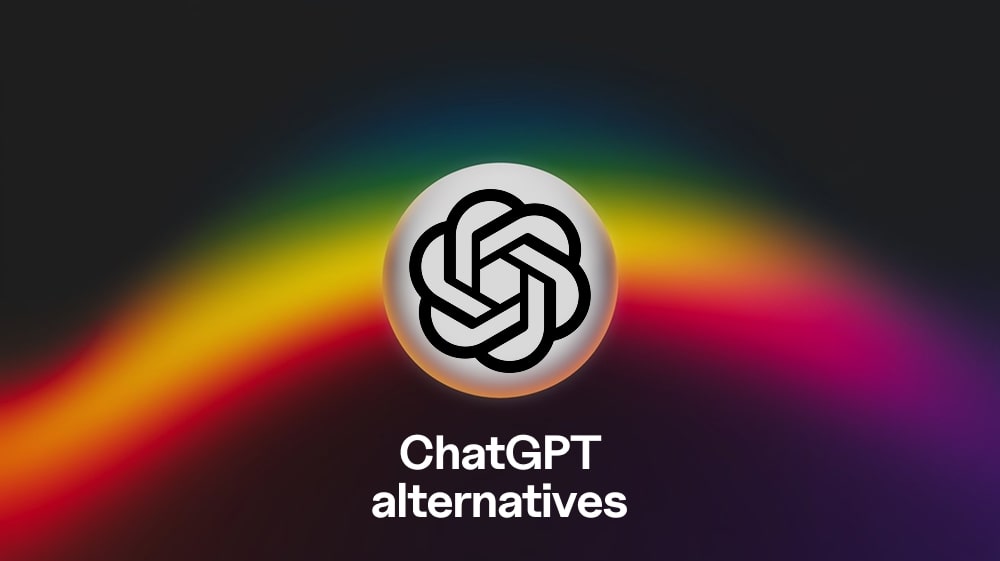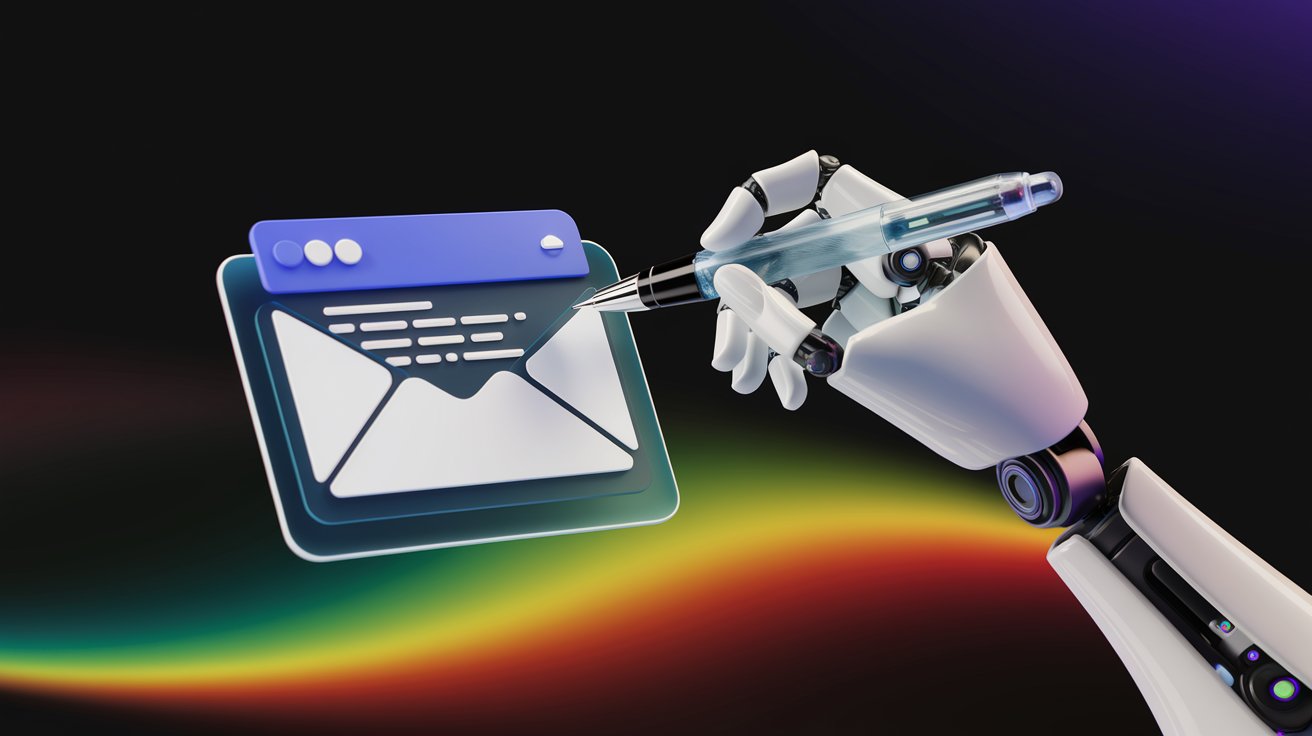TL;DR — Top Picks by Use Case
Looking for a ChatGPT alternative that's exactly fitting your needs? Here's a quick summary.
- General-purpose AI platforms: DeepSeek, Claude, Gemini, Cohere – fast, broad-knowledge chat when you need a versatile ChatGPT alternative.
- Privacy-first (no data exhaust): local runtimes like Ollama + open models (Llama, Mistral), and LM Studio if you prefer a GUI on your laptop. Atomic Mail’s private, built‑in AI assistant for email (inbox‑native). These ChatGPT alternatives keep prompts off third‑party training pipelines.
- Deep research & fact‑checking: Perplexity for source‑linked answers; Elicit for academic‑grade discovery. Great alternatives to ChatGPT when citations and retrieval‑augmented reasoning matter more than style.
- Writing & long‑form: Claude for long context and subtle tone; Gemini Advanced for multilingual work and media; Cohere Command for crisp business copy.
- Coding & pair programming: GitHub Copilot for IDE‑native speed; Cursor for repo‑aware refactors; Code Llama locally via Ollama when you can’t share code. An alternative to ChatGPT here means tighter IDE integration and codebase context.
- AI agents & automation: LangChain/CrewAI/AutoGen if you’re building flows; lightweight agents inside tools (email, docs, CRM) for day‑to‑day chores. Choose these alternatives to ChatGPT when you need multi‑step, tool‑using autonomy.
- Enterprise productivity suites: Microsoft Copilot (M365) or Google Workspace + Gemini if your team already lives there and needs governance, DLP, and audit trails.
- Free & budget‑friendly: Local open‑source models on consumer GPUs/Apple Silicon; freemium portals like Poe to test multiple models in one place. Cheap, fast experiments to find your personal best ChatGPT alternatives.
- Creative & multimodal: Midjourney/Ideogram (images), Descript/ElevenLabs (audio/voice). These are purpose‑built alternatives to ChatGPT for media work.
What Is ChatGPT (in few seconds)
ChatGPT is probably the most well‑known AI tool, developed by OpenAI and launched publicly in November 2022. ChatGPT is an easy-to-use chatbot that uses large language models (LLMs) to generate answers by predicting the next token from your prompt and the context you provide.
How it works:
- Pretraining: The model takes in huge amounts of text to learn language structure.
- Instruction tuning: It learns to follow human‑style instructions.
- Reinforcement learning from human feedback (RLHF): Humans rate outputs; the model aligns to helpfulness/harmlessness.
- Context window: You paste a prompt + optional files; the model processes everything at once and replies.
- Tools/RAG: Some stacks let the model call tools (search, code exec) or retrieve documents from a vector database for facts.
Where it shines:
- Accessibility: It's really easy to use and pretty much anyone can do it
- Fast drafting, ideation, summarization
- Polished, on‑brand tone with light guidance
- Memory allows it to remember user preferences across conversations
- Continuous improvement and ecosystem. OpenAI's iterative deployment ensures a consistent flow of new features, and its large user base creates a powerful network effect
Where it struggles (and why you're here):
- Factuality without sources: Hallucinations happen when no retrieval is used.
- Reasoning under ambiguity: Multi‑step logic can derail without guardrails/tests.
- Private data risk: On consumer tiers, prompts may be used to train models unless you opt out; Team/Enterprise/API are excluded by default. Data is encrypted in transit (not E2EE), and authorized staff may access conversations for safety and support.
- Determinism: Same prompt ≠ same answer unless you fix temperature and context.
Why people seek a ChatGPT alternative: They want better privacy, domain‑specific accuracy, stronger integrations (IDE, docs, email), transparent citations, or lower/controllable costs (local inference, flat pricing).
Quick Comparison Table – Best ChatGPT Alternatives (At a Glance)
(A fast scan before deep dives. Use this to shortlist the right alternative to ChatGPT.)
Use this table to pick your short list, then jump to the category sections for deeper analysis of each ChatGPT alternative.
Best Alternatives by Use Case (Editors’ Picks)
Now, let's move beyond the summary. We've tested countless ChatGPT alternatives to find the champions in each category.
General-purpose AI platforms
What they are: Broad chat systems that balance reasoning, drafting, and Q&A. Ideal when you want a drop-in alternative to ChatGPT without rebuilding workflows.
Google Gemini (USA, 2023)

As Google's direct answer to ChatGPT, Gemini is a smart and flexible model that's designed to be the brains of its whole product ecosystem. Its key strength is its native multimodality (it was built from the ground up to understand text, images, audio, and video) and its deep hooks into Google's universe, from Search to Workspace.
Best for: Google‑centric workflows; multilingual/multimodal work.
✅ Pros: Excellent free offering, deep app integration; strong translation and media understanding, integrated with Google Search for more current information.
❌ Cons: Output quality varies by domain; can be overly "chatty" and verbose; privacy is a significant trade-off.
Plans & pricing: Free; Gemini Advanced (~$19.99/mo); Workspace add‑ons per‑seat.
Privacy concerns: It's a Google product. This is the quintessential example of a "data-for-service" transaction. Your conversations are analyzed and used to refine Google's AI and enhance your user profile for advertising (free users). It is one of the most powerful alternatives to ChatGPT, but it is not a private one.
DeepSeek (China, 2024)
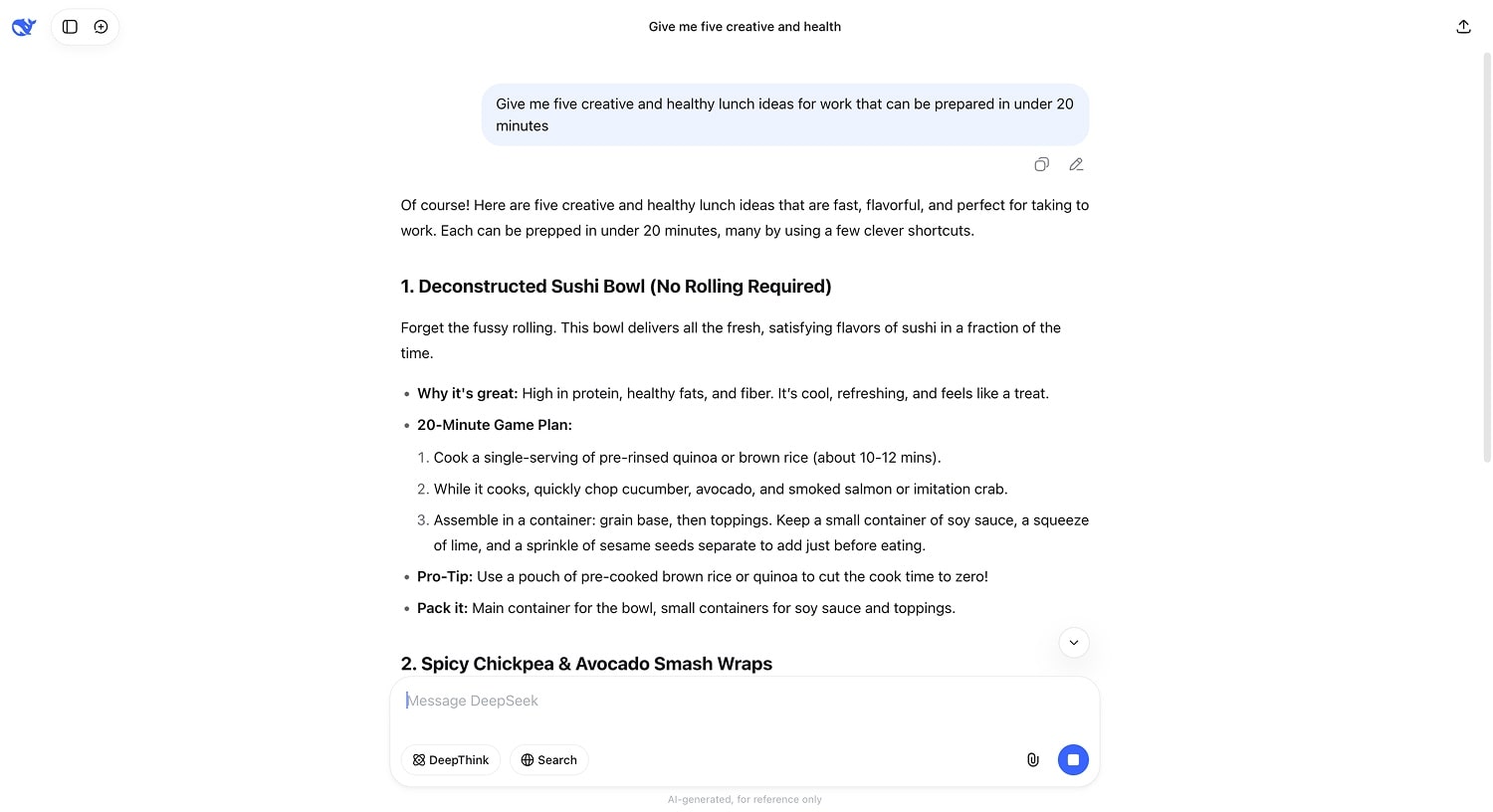
DeepSeek is a general‑purpose chatbot built by DeepSeek (Shanghai), focused on high‑throughput inference and multilingual coverage. Notable for fast responses and competitive reasoning in everyday tasks. Suitable as a drop‑in ChatGPT alternative for broad prompts and analysis.
Best for: Daily drafting, brainstorming, multilingual Q&A.
✅ Pros: Fast; long context; strong for general tasks; budget‑friendly tiers.
❌ Cons: Niche technical depth varies; benefits from retrieval for citations.
Plans & pricing: Free; API for developers and power users (from ~$0.14/1M tokens); enterprise quotes.
Privacy concerns: Consumer use may log queries for quality; verify business controls for retention/no‑training.
Claude (USA, 2023)
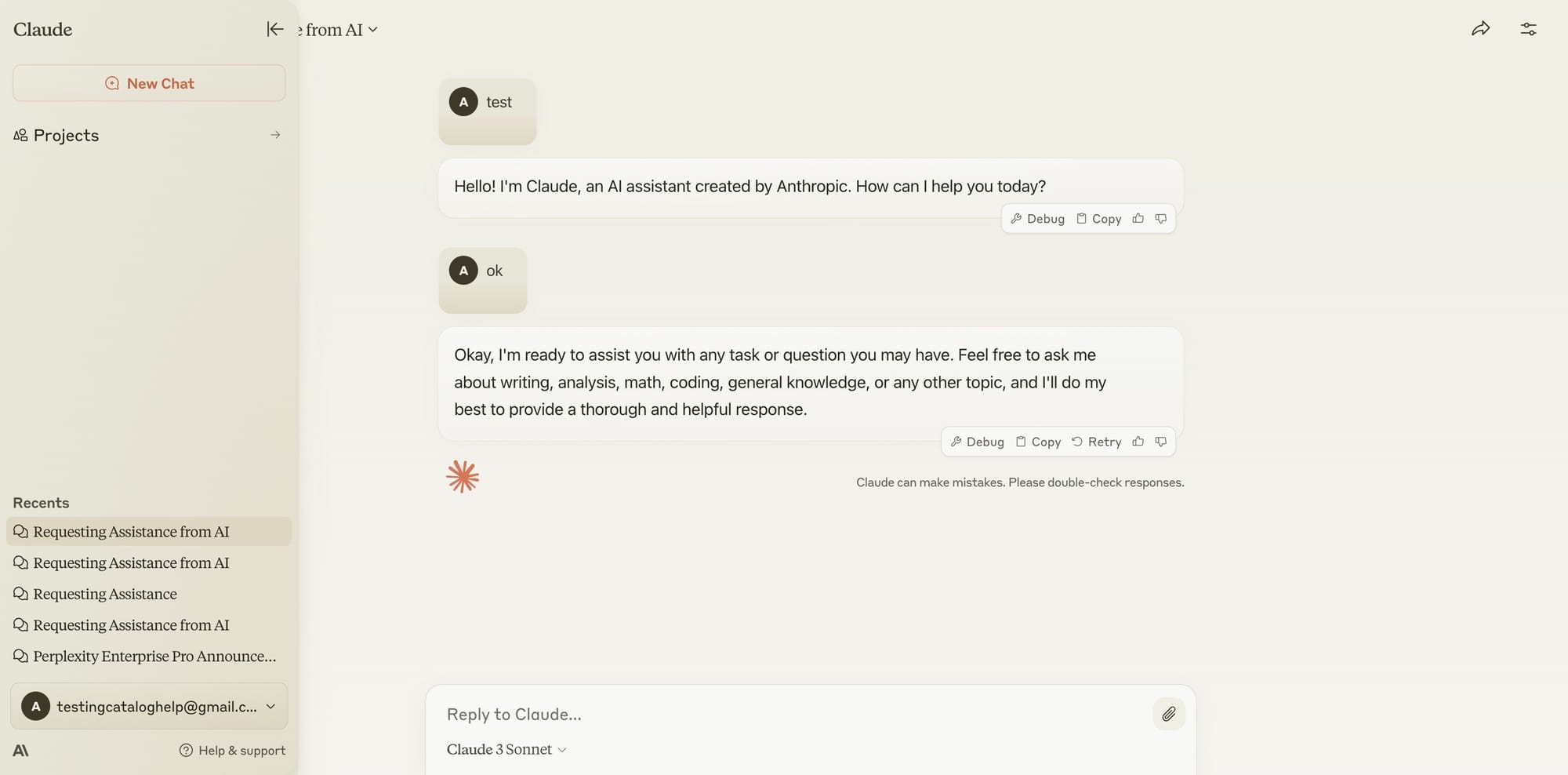
Developed by former OpenAI researchers, Anthropic's Claude prioritizes safety, ethics, and interaction quality. Anthropic’s conversational model designed for helpfulness and safety with very large context windows (excellent for long documents). Strong writing tone control and summarization.
Best for: Long‑form writing, analysis, policy/comms work.
✅ Pros: Nuanced tone; industry-leading context window (200K token), allowing it to analyze extremely large documents; outputs often feel more natural and less “AI-generated.”
❌ Cons: Conservative guardrails; lacking native image generation; occasional refusals on edge cases.
Plans & pricing: Free (Sonnet); Pro (~$20/mo); Team (~$30+/seat/mo); Enterprise custom.
Privacy concerns: Commercial API customers have their data protected. However, for free and Pro consumer users, your conversations can be used to train their models unless you explicitly opt out.
Privacy-first & local / on-device
What they are: Alternatives to ChatGPT that keep prompts and documents off third-party training pipelines. Local models run on your hardware; privacy-first SaaS limits access and retention by design.
Ollama + open models (Global, 2023)

Ollama is a streamlined, open-source tool created by developer Jeffrey Morgan that makes running powerful language models on your own machine very easy. It works from the command line, meaning you can pull and run models like Llama 3 or Mistral with just one command. It's the quickest way for a tech user to get a private AI up and running.
Best for: Private prompts, offline work, experiments without cloud risk.
✅ Pros: Data stays local; $0 variable usage; flexible model swaps; lightweight and efficient; strong community support.
❌ Cons: Needs disk space; no graphical user interface (GUI) out of the box, though third-party clients exist; requires a good CPU/GPU; manual model curation.
Plans & pricing: Free (open‑source models).
Privacy concerns: On‑device by default (data never leaves your machine); no third‑party prompt retention.
LM Studio (US, 2023)

LM Studio is a US-based startup that's developed a sleek graphical user interface (GUI) for the same task as Ollama. It works as a discoverability browser and a control panel for downloading and running a huge library of open-source models completely offline. It's meant to make local AI available to a wider audience.
Best for: Users who want privacy of local inference with minimal setup.
✅ Pros: Friendly UI; quick model switching; offline capability.
❌ Cons: Can be resource-intensive, requiring a powerful computer with a dedicated GPU for best performance; initial setup can be confusing for absolute beginners.
Plans & pricing: Free (open-source).
Privacy concerns: Fully local inference; no external logging.
Atomic Mail – private AI in an encrypted inbox (EU, 2025)
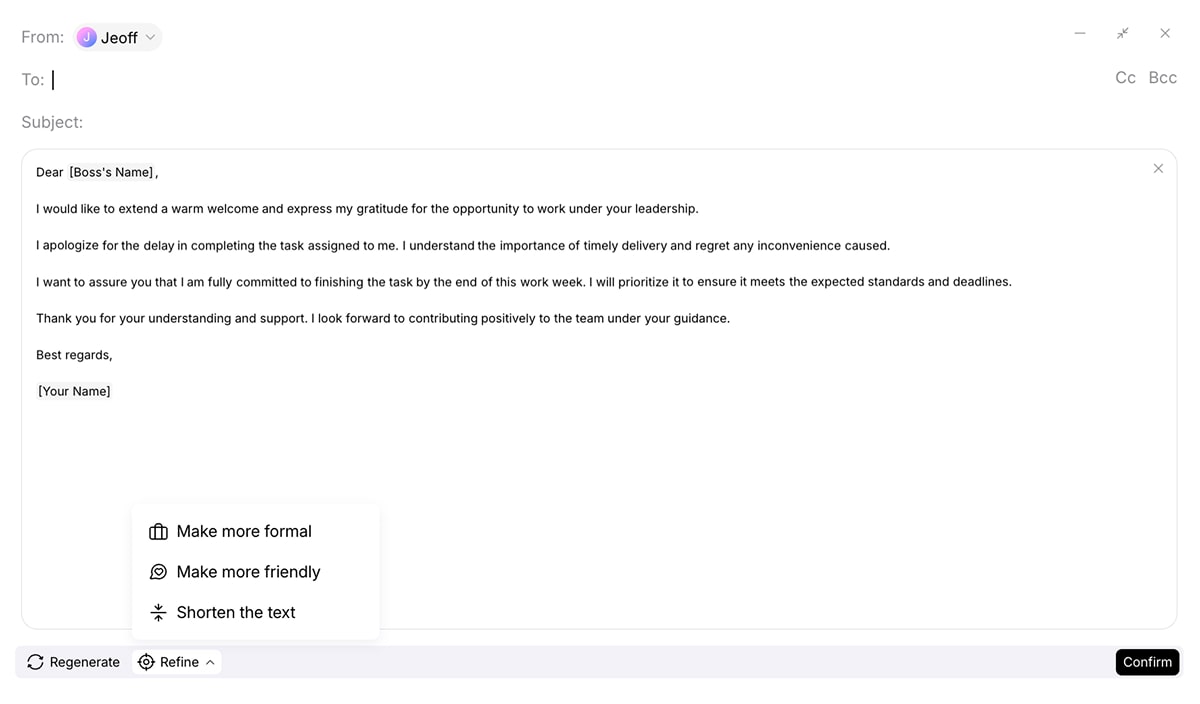
Secure email service with a private AI suite (Writer, Summarizer, Security Helper, Text↔Voice) directly in your mailbox. It's designed for practical privacy – giving you AI-powered help right where you do your most sensitive work: your email.
Best for: Drafting/replying/summarizing emails privately without exposing data to a third-party AI provider; day‑to‑day productivity with confidentiality.
✅ Pros: No more copying and pasting sensitive information between email and a separate AI tool; no prompt training; no AI access to unencrypted content.
❌ Cons: Inbox‑native assistant (not a general chat portal).
Plans & pricing: Free tier currently; paid plans are expected soon.
Privacy concerns: Prompts processed in‑session, not retained for training; zero‑access mailbox; E2EE for mail. It offers the convenience of a cloud AI with the security of a local one.
Deep research & fact-checking
What they are: Search-first tools with citations and retrieval-augmented reasoning.
Perplexity (USA, 2022)
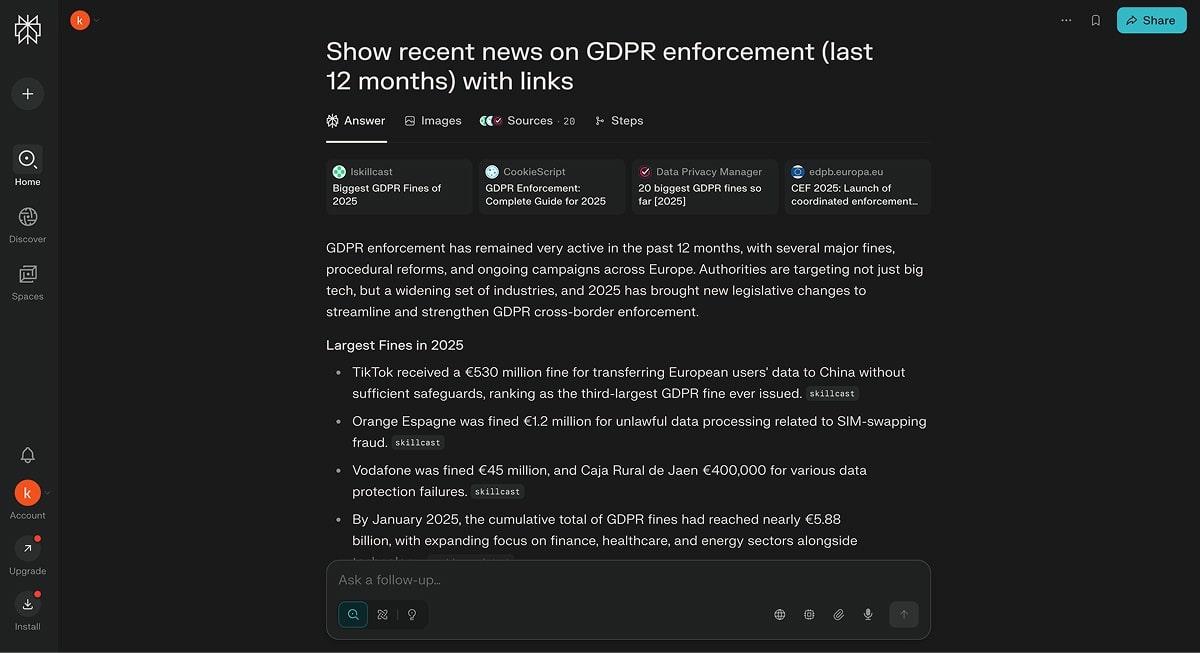
Founded by former AI researchers from Google, Meta, and OpenAI, Perplexity is a San Francisco-based startup that has a singular focus: delivering accurate, cited answers. It’s an "answer engine" that searches the web in real-time and puts together results with footnotes, so you don't get the same kind of "hallucinations" that you do with other models.
Best for: Analysts, writers, students demanding source links.
✅ Pros: Source‑first; quick synthesis; good follow‑up pathways. The "Focus" feature can zero in on academic papers, WolframAlpha for computation, or YouTube for video.
❌ Cons: Not a creative partner; its writing style is informative but dry. The free version's "Pro Search" (its most powerful feature) is limited.
Plans & pricing: Free; Pro (~$20/mo); Enterprise (custom).
Privacy concerns: Perplexity collects your search queries, conversation history, and usage data to improve its services. While they state anonymized data may be used for training, your complete research history is still stored on their servers.
Elicit (USA, 2021)
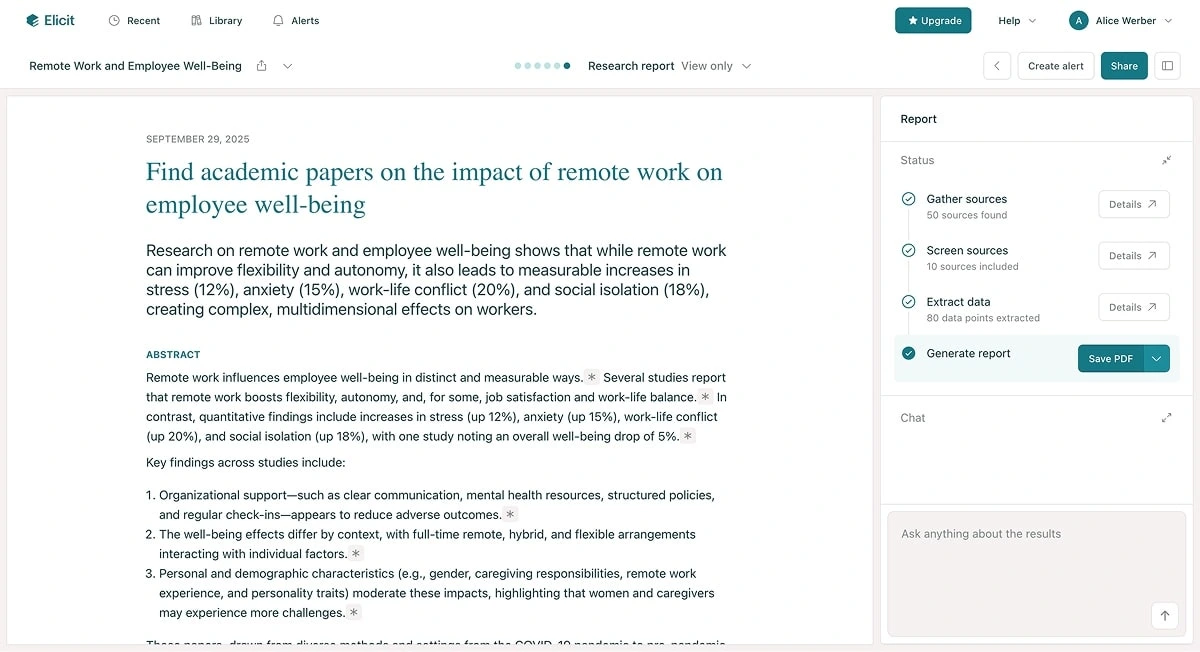
Elicit is a research assistant specifically for academic literature, created by the non-profit research lab Ought. It doesn't just find papers – it reads them. You can ask a research question, and Elicit will provide a summary of findings from the top several papers, showing the key information in a structured table.
Best for: Literature reviews, research, and methodology comparisons.
✅ Pros: Paper‑aware workflows; structured outputs; focus on research quality; helps find relevant papers you might have missed.
❌ Cons: Highly specialized for academic/scientific papers; not useful for general web research. Can be slow.
Plans & pricing: Free (one-time starting credits); Credits (pay-as-you-go).
Privacy concerns: As a tool for academics, it has a more respectable privacy policy, but your research queries and interactions are still processed and stored on their servers.
Brave Leo AI (USA, 2023)

The team behind the privacy-focused Brave Browser built Leo AI, an AI assistant integrated directly into the browser. Its main strength is its ability to understand the context of the webpage you're currently on. You can ask it to summarise an article, explain a concept, or generate ideas based on the page's content.
Best for: Privacy-conscious web browsers who need quick summaries and analysis of pages without sending data to a third party.
✅ Pros: Conveniently placed in your browser sidebar; can process web pages and PDFs.
❌ Cons: Model quality is generally a step behind the dedicated market leaders; less powerful for tasks that don't involve a specific webpage.
Plans & pricing: Free; Premium (~$15/mo).
Privacy concerns: User inputs are submitted through a reverse proxy that anonymizes requests, so user identity is not linked to the query. Conversations are not saved by Brave and are not used for model training. This makes it a very strong privacy-conscious alternative to ChatGPT for web-based tasks.
Coding & pair programming
What they are: Tools that understand code context.
GitHub Copilot (USA, 2021)

GitHub Copilot is a collaboration between Microsoft's GitHub and OpenAI, launched in 2021. It's more than an autocompleter; it's an "AI pair programmer" that analyzes the context of your code and comments to suggest entire blocks of code, functions, and tests.
Best for: Autocomplete, boilerplate, and quick refactors/tests for developers.
✅ Pros: Unmatched integration with VS Code; dramatically reduces time spent on boilerplate and repetitive tasks; Copilot Chat feature allows debugging in natural language.
❌ Cons: Over‑suggestion; sometimes suggests insecure or outdated code patterns; potential licensing/IP diligence needed.
Plans & pricing: Individual (~$10/mo); Business (~$19/seat/mo); Enterprise (custom).
Privacy concerns: It was trained on a vast corpus of public code from GitHub. While the Business plan has policies to prevent your code from being used as training data, extensive telemetry is still collected. The potential for leaking proprietary logic remains a significant risk.
Cursor (USA, 2023)

Cursor is an entire AI-native code editor. It's a "fork" of VS Code, rebuilt from the ground up to be centered around AI interaction. You can highlight code and ask questions, create code from scratch, or automatically debug with deep awareness of your entire codebase.
Best for: Working inside existing codebases with context.
✅ Pros: Project‑level reasoning; integrated refactor/test actions; features like "Fix & Diff" make debugging faster.
❌ Cons: Editor switch; learning curve for prompts/flows.
Plans & pricing: Free; Pro (~$20/mo); Business (~$40+/seat/mo).
Privacy concerns: Local + cloud mix; configurable logging. While they have a "Privacy Mode" for enterprise customers, the default behaviour involves sending your code snippets to their servers for processing.
Code Llama (Meta, 2023) via Ollama

Code Llama is a family of powerful open-source coding models released by Meta in 2023. It's not a product you buy but a model you run yourself. Using a tool like Ollama, you can run Code Llama entirely on your local machine.
Best for: Private code assistance with no cloud exposure.
✅ Pros: Offline; controllable; free to run; can be fine-tuned on your own private codebase for hyper-specific suggestions.
❌ Cons: Requires capable hardware; demands significant technical skill; quality varies by variant/quant.
Plans & pricing: Free (open-source).
Privacy concerns: Data stays on device; no external training or retention.
AI agents & workflow automation
What they are: Systems that chain tools and steps to complete tasks autonomously or semi-autonomously.
LangChain / CrewAI / AutoGen (Global, 2022–2024)
These are not end-user tools but open-source Python libraries for developers. LangChain, AutoGen (from Microsoft), and CrewAI provide the building blocks to create your own autonomous AI agents that can reason, plan, and use other tools to handle complex tasks.
Best for: Developers and programmers who want to build their own custom AI agents and applications.
✅ Pros: Rich ecosystem; tool calling; evaluation loops; self‑hosting options; gives developers immense power and flexibility to build custom AI solutions.
❌ Cons: Engineering overhead; monitoring and safety hardening required. These are toolkits, not finished products.
Plans & pricing: Open‑source; managed/hosted options and add‑ons.
Privacy concerns: The privacy depends entirely on how the developer uses the framework. If you use it to call a third-party API like OpenAI's, you inherit their privacy risks. If you use it with local models via Ollama, you can build a completely private agent system.
Enterprise productivity suites
What they are: AI assistants embedded across email, docs, meetings, and storage with admin governance.
Microsoft Copilot for Microsoft 365 (USA, 2023)
.jpg)
Microsoft Copilot is Microsoft's ambitious integration of AI across its entire office suite. It uses the "Microsoft Graph" to ground its responses in your company's own data (your emails, chats, documents, and meetings) providing highly relevant, context-aware assistance.
Best for: Organizations that use Microsoft software for work.
✅ Pros: DLP, audit, role‑based access, tenant isolation, SSO.
❌ Cons: Enterprise pricing; requires disciplined data hygiene.
Plans & pricing: Enterprise (~$30/seat/mo); Copilot Pro for individuals (~$20/mo).
Privacy concerns: Microsoft promises that your internal data (the "Graph") won't be used to train its public foundation models. But this is a complex system, so you're relying on their security architecture to prevent data leakage between tenants or to the outside world.
Google Workspace + Gemini (USA, 2023)

Google's direct competitor to M365 Copilot, integrating Gemini into Gmail ("Help me write"), Docs, Sheets, and Meet. It uses your data within the Google ecosystem to do similar tasks, like summarising email threads or generating text and images in documents.
Best for: Businesses that run on Google Workspace.
✅ Pros: Native collaboration; real‑time co‑editing; strong multilingual; often faster and more creatively flexible than Microsoft's offering
❌ Cons: Requires careful configuration for privacy/compliance. The line between your corporate data and Google's wider data processing can feel blurrier than with Microsoft's more enterprise-focused history.
Plans & pricing: Enterprise (~$30/user/mo add-on to Workspace plans).
Privacy concerns: Google's policy is similar to Microsoft's, in that your Workspace data remains your own and isn't used to train public models. But you're still running your company's main operations using a third-party AI, which is a big risk.
Cohere (Canada, 2022)
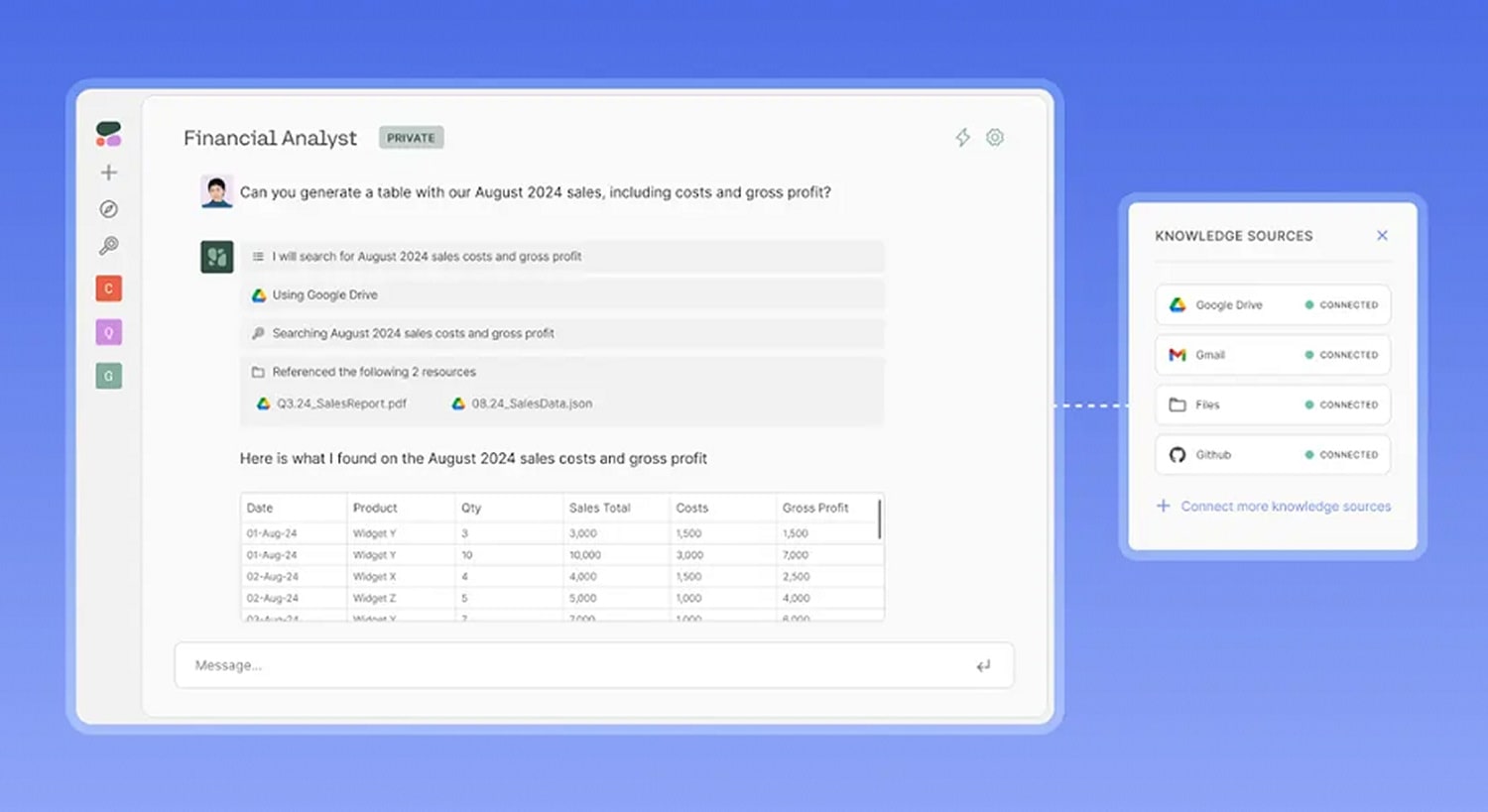
Founded by ex-Google Brain researchers in Toronto, Canada, Cohere focuses exclusively on AI for the enterprise. They provide powerful models that can be deployed within a company's own private cloud (like AWS, GCP) or via a secure API. Their specialty is called Retrieval-Augmented Generation (RAG), which means they can “read” your company's private knowledge base to provide accurate answers.
Best for: Enterprises, especially in regulated industries, that need to deploy powerful models on their own private data.
✅ Pros: Privacy-first approach to enterprise AI; allows businesses to leverage their own data securely; avoids sending sensitive information to a public third-party.
❌ Cons: Requires significant technical resources to implement; more of a platform for developers than a ready-made tool for end users; smaller public ecosystem; fewer consumer‑facing apps.
Plans & pricing: Usage‑based API; enterprise contracts.
Privacy concerns: By design, Cohere allows a much more secure and private deployment of AI than public-facing suites. It's a leading choice for organizations in regulated industries.
Free & budget-friendly options
Most of the ChatGPT alternatives we've talked about have a free tier that usually works well enough for most people. Claude 3, Google Gemini, and Perplexity all offer incredible technology at no financial cost.
But it's important to remember that free AI services usually come with privacy risks. These free tiers are the biggest data-gathering operations ever. Every prompt is a piece of data that can be used to improve a multi-billion-dollar business. When it comes to any task involving personal, financial, or proprietary information, the hidden cost of "free" is far too high, so choose paid plans.
Creative & multimodal
What they are: Tools specialized in generating and editing media.
Midjourney (USA, 2022)

Midjourney is really good at producing artistic and coherent AI images. It famously runs through the chat app Discord, creating a unique, collaborative environment where creativity is a public performance.
Best for: Artists, designers, creatives, and marketing teams needing high‑fidelity imagery.
✅ Pros: Strong aesthetics; fast iteration; wide style range.
❌ Cons: Discord/web UX quirks; licensing diligence for commercial use.
Plans & pricing: Basic (~$10/mo), Standard (~$30/mo), Pro (~$60/mo), Mega (~$120/mo).
Privacy concerns: Privacy is almost non-existent by design. It's a public forum. A "Stealth Mode" is available on the Pro Plan, but this only hides your images from public view in the gallery; the company still processes and stores your prompts and creations.
Ideogram (Canada, 2023)
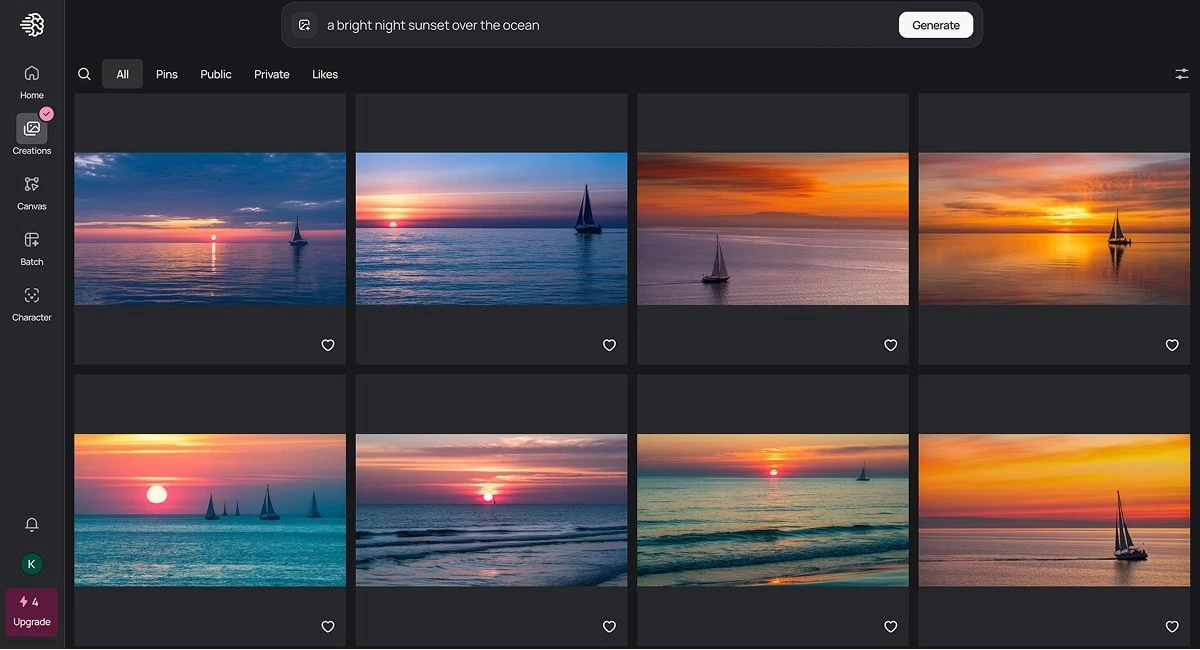
A Toronto-based startup founded by former Google Brain researchers, Ideogram launched in 2023 with one killer feature: reliably rendering text within images. Other models make words look rough and ready, but Ideogram is spot on, making it great for logos, posters and memes.
Best for: Marketers, designers, and social media creators who need to reliably generate images (especially containing text).
✅ Pros: Clean text rendering; brand‑friendly layouts; the best tool on the market for generating images with accurate text; "Magic Prompt" feature helps enhance your ideas.
❌ Cons: Style control still evolving; queue times at peak; general image quality and realism can sometimes lag behind Midjourney.
Plans & pricing: Free; Basic (~$8/mo); Plus (~$20/mo).
Privacy concerns: Similar to Midjourney, free usage is public. The paid plan allows private generations, but your prompts are still processed by their servers.
Descript & ElevenLabs (Audio/Video)
These two platforms are leading the way in generative audio and video. Descript (US) is a video and podcast editor that lets you edit media as easily as a text document. If you delete a word in the transcript, it'll also delete the word from the audio. ElevenLabs (UK) has the world's most realistic AI voice generation and cloning, so you can create speech from text in any voice.
Best for: Podcasters, video creators, audiobook producers, and marketers.
✅ Pros: Dramatically lowers the barrier to high-quality audio/video production. ElevenLabs' voice quality is amazingly realistic.
❌ Cons: The potential for misuse (deepfakes, misinformation) is enormous. Voice cloning requires explicit consent but is difficult to police.
Plans & pricing: Both offer multiple tiers. Descript: Free; Creator (~$15/mo); Pro (~$30/mo). ElevenLabs: Free; Starter (~$5/mo); Creator (~$22/mo).
Privacy Concerns: Big ethical questions. You're uploading voice data and video content to their servers. Their policies say they won't misuse your data, but you're trusting them to be the only ones to handle your highly sensitive biometric data. The risk of deepfake creation makes these tools powerful but dangerous in the wrong hands.
The Real Risks of Using AI
Adopting generative AI brings huge potential for change, but there are also a lot of risks that are all connected. If you want to deploy responsibly, you need to be realistic about the dangers, from perpetuating societal biases to creating new cybersecurity threats.
Hallucinations & factual risk
Models can invent citations, misread tables or confidently output false steps. Treat answers that haven't been grounded as drafts, not decisions, unless you layer retrieval, citations, and testing.
Data leakage & prompt logging
If prompts/attachments are logged or used for training, sensitive inputs can stick around in logs or review queues. Consumer plans often have training as part of their package, so it's worth checking the business terms and how long your data is kept for.
IP & licensing pitfalls
Any text, code or images you generate might have to comply with existing rights or obligations relating to training data. Make sure you keep track of where everything comes from (sources, model, version, temperature) and check third-party licenses before you publish or ship.
Compliance (GDPR/CCPA, SOC 2, HIPAA)
Map out personal data flows, data processors, sub-processors, retention, and data residency. Make sure you've got DPA/BAA coverage where needed and check access controls, auditability, and breach notification obligations.
Vendor lock‑in & model drift
If you've got all your prompts linked to one model/API, it's going to be tricky to switch. As models are updated, outputs can change (drift). Make sure you keep prompts portable and build abstraction layers (routing, evals, tests).
Cost unpredictability & rate limits
Usage-based pricing balloons with long contexts and batch jobs. Set token budgets, failover behaviour, and back-pressure policies; cache results and trim prompts.
How to use AI safely: Framework for Responsible AI Adoption
Knowing the risks isn't a reason to avoid AI, it means you've got to be smart and have a security-first mindset. Here's a useful guide to using AI without losing your digital integrity.
Protect Sensitive Information: Never share personal, financial, or confidential company data with public AI services.
Privacy‑first providers vs. local inference: For low‑risk tasks, hosted tools can be OK. For sensitive work, prefer a ChatGPT alternative that is end‑to‑end encrypted, zero‑access by design, or run models locally to avoid third‑party logs.
Think critically and verify everything: Treat all AI outputs as a first draft. Always double-check critical information against reliable primary sources.
Understand the tool's limitations: Be aware that AI can have outdated knowledge, contain biases, and lacks genuine understanding.
Uphold academic and professional integrity: Be transparent about AI use in accordance with your institution's policies. Submitting AI-generated work as your own is plagiarism.
Report harmful content: Use the platform's feedback tools to report biased or offensive outputs to help improve the system's safety.
Procurement checklist for teams:
- Data flow: where prompts/outputs live; who can access them
- Training: whether prompts are used for model training (defaults, opt‑outs)
- Retention: how long logs persist; how to delete/export
- Residency: where data is stored/processed
- Security: E2EE at rest/in transit, zero‑access, key management
- Compliance: DPA/BAA, audit reports, incident response
- Portability: export APIs, vendor‑agnostic formats
- Cost controls: quotas, alerts, per‑seat limits
If any box stays unanswered, consider a privacy‑first ChatGPT alternative or keep inference on‑prem.
Choose Atomic Mail – Secure Email Service with Built-In Private AI Assistant
The above playbook works, but it’s heavy. Redacting prompts slows down actual work, and running local models requires time, a GPU and maintenance. Meanwhile, all your most sensitive information is stored in one place: your inbox. Contracts, financial information and health details – your inbox holds it all. This is precisely where you need AI the most and where copying and pasting into public tools is the riskiest. Atomic Mail closes this gap by providing inbox-native private AI assistant that boosts productivity without handing your data to strangers.
Atomic Mail at a glance
A secure, encrypted email service with a private, built‑in AI.
What you gain
- End‑to‑end encrypted inbox & zero‑access architecture – we can’t read your encrypted mail.
- Anonymous sign‑up & seed‑phrase recovery – privacy from day one and robust account recovery.
- Aliases for privacy and organization – segment identities, block spam, reduce tracking.
- Private AI suite (Writer, Summarizer, Security Helper, Text↔Voice) – built right into your inbox. In‑session AI processing with no prompt retention for training, so your drafts stay yours.
Why this is a strong ChatGPT alternative for daily work
Your email inbox is where sensitive information is usually exchanged – plans, contracts, relationships, and so on. Storing AI in an end-to-end encrypted, zero-access inbox reduces data risk, speeds up workflows, and minimises context switching. It's privacy first, productivity always.
✳️ Sign up for Atomic Mail and secure your communications.
